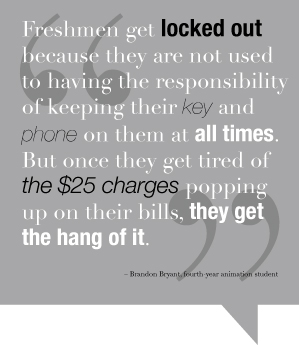According to the resident assistant (RA) staff at Spring House, an average of four to five residents accidentally lock themselves out of their dorm rooms each day. First-time incidents usually leave students with no more than the inconvenient and potentially embarrassing experience of having to request re-entry from the RA on duty. Students are allowed one free lockout per academic year. Subsequent lockouts, however, cost $25 per incident and appear as charges on the offending student’s account.
“The obvious thing is for residents to make sure they have their key with them,” said Brandon Bryant, fourth-year animation student and second-year Spring House RA. “Instead of calling the RA when locked out, residents should call their roommates because, often times, roommates are still in the room.”
 Residence Life and Housing staff members encourage residents to cultivate relationships with their roommates to improve their overall quality of life as well as avoid such costly incidents. Still, lockouts persist with first-year residents as the most common offenders.
Residence Life and Housing staff members encourage residents to cultivate relationships with their roommates to improve their overall quality of life as well as avoid such costly incidents. Still, lockouts persist with first-year residents as the most common offenders.
“Typically freshmen get locked out about every other week because they are not used to having the responsibility of keeping their key and phone on them at all times,” Bryant explained. “But once they get tired of the $25 charges popping up on their bills, they get the hang of it.” Bryant reiterated the importance of checking pockets, purses and backpacks for keys and phones whether students plan to leave their rooms for five seconds or five days.
Christabel Shum, first-year fashion design student, has been locked out once this quarter. She described her experience as “annoying.”
“I left my room and came downstairs to get my laptop. I realized I didn’t have my key when I went back upstairs,” Shum said. “My RA wasn’t in the office and my roommate has not moved in yet. I had to just chill in the lobby until my RA returned.” Although Shum did have her cell phone on her person, she did not have the RA’s contact information programmed. Residence Life and Housing staff members advise students to keep their RA’s contact info handy because even if an RA isn’t in the office, he/she is still on duty and reachable by phone.
“I’ve never gotten locked out of my room,” said Brielle Berenato, first-year advertising graduate student and ACA resident. “I hang my keys on a hook right next to my door and I have to use my key to lock the door from the outside.”
Spring House students, however, don’t have the same key and lock situation as Berenato and other residents of ACA. Formerly a hotel, Spring House features doors with key card lock systems, thus doors automatically lock upon closure and keys can’t be stored on a key ring. Residence Life and Housing staff discourage students from punching holes in key cards because the key cards are school property. Additionally, key cards often become demagnetized and cease to trigger the door’s unlocking mechanism. When demagnetization occurs, students are not charged to regain access to their rooms.
Residents can avoid key card demagnetization by always keeping the key cards in a wallet or protective sleeve. If the wallet contains multiple cards with magnetic strips, then cards should be separated and kept as far away from one another as possible. Also, residents should avoid keeping their key cards around powerful magnets including speakers and televisions sets. Even some wallets with magnetic clasps can affect the strip.























